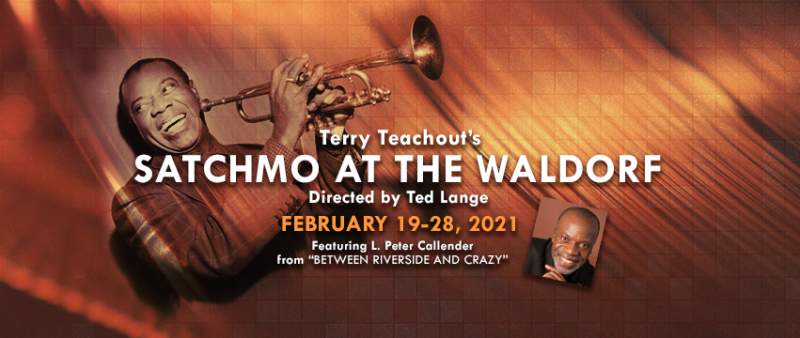BWW Previews: ICONIC TRUMPETER, LOUIS ARMSTRONG PORTRAYED BY L. PETER CALLENDER IN SATCHMO AT THE WALDORF at American Stage
SATCHMO AT THE WALDORF examines the life and struggles of the "Patriarch of Jazz"

After our interview, I changed my morning wake up song in Alexa's routines. Veteran actor L. Peter Callender is right. If you wake up to Louis "Satchmo" Armstrong's "What A Wonderful World," there is no better way to set a positive tone for your day.
Imagine being a beloved jazz trumpeter, performing to the thunderous applause of an appreciative, predominantly-white audience in opalescent ballrooms of extravagant hotels, and after your ovation, not being allowed to eat or sleep in that hotel. Envision you are ushered out the back door and left to make a sandwich of bread and cold sardines on a bus.
"Sometimes, in white restaurants with colored cooks, Louis would knock on the door and ask 'what you got for "Satchmo" today?' and he'd eat standing in the kitchen," said L. Peter. "This is a story of resiliency."
L. Peter went on to explain that Louis "Satchmo" Armstrong never protested, never lost the huge smile that earned him the nickname "Satchmo" because his grin looked like a satchel mouth. In Europe, it was abbreviated to "Satchmo." He adored what he did, and despite the vast disparity and racial divide he faced at every venue, he loved entertaining.
"Insightful, illuminating, and thought-provoking" are the words L. Peter used to describe Terry Teachout's "Satchmo at the Waldorf," his upcoming virtual one-man performance at American Stage as Louis, Joe Glaser, his white manager, and Miles Davis, a fan of Louis' musical gift, disliked his onstage manner.
"I'm looking to bringing a color to each of these characters I portray and ultimately bringing them to life."
Directed by Ted Lange of "The Love Boat" fame, opening February 19 and running through February 28 with 12 pre-recorded performances, "Satchmo at the Waldorf" is set in 1971, Louis' last public performance, four months before his passing. The show takes place in a dressing room backstage at the Empire Room of New York's Waldorf-Astoria Hotel. Louis is reminiscing into a tape recorder about his life and relationship with his manager.
"We know that Louis makes us smile, that he sings beautifully, that he plays the trumpet magnificently. We know that he was the patriarch of jazz. We know these things about him, but there are lots of other things that I learned, and I've been a fan for years," he said. "The theme of the show is openness, learning about this man, and digging a little deeper into his life. It's very illuminating to me. We see how we how he made through despite all the obstacles, like being very poor as a child. Struggle, determination, love of life, love of race, love of all people - I think those are the main themes of this story."
L. Peter explained that Louis has a universal appeal - black, white, young, old, musicians - everyone.
"Louis Armstrong was America's ambassador of jazz. Though he was going through some torturous times in his life, he spoke about singing the blues to make you smile. To hear what this man went through, how he made it through with laughter, music, and smiling, everyone should get a chance to see - to relate to this larger than life human being that if he were still alive today, he would still be charming and making people laugh. He taught young people to play the trumpet; he taught people how playing the blues can be a happy medium. He taught the greatest trumpeters of our day, and those to come will always thank Louis Armstrong for what he's done for jazz. Everyone should get a chance to learn about the great Louis "Satchmo" Armstrong. I'm just hoping people will watch it and will enjoy it."
To learn more or to purchase tickets, visit http://americanstage.org/Satchmo. Individual recorded performance streams are available for $15 for performances Feb. 19-28.
Comments
Videos

